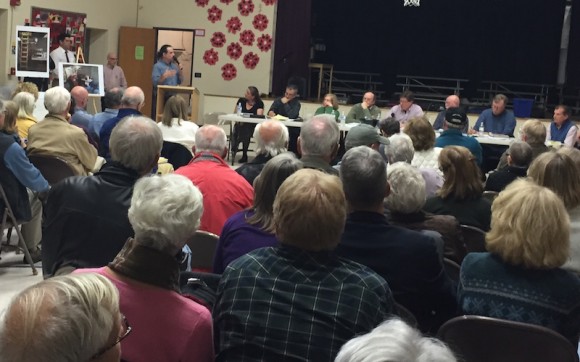
LYME — Supporters and opponents of an application by Sunset Hill Vineyard for a special exception permit to offer tastings and sell wine at its Elys Ferry Rd. farm filled the auditorium of Lyme Consolidated School Monday night at a three-hour hearing by the Lyme Planning and Zoning Commission on the proposal.
More than 175 Lyme residents packed the special meeting seats and lined the walls to hear Matt Caruso, a partner in Sunset Hill Vineyard, and a team of wine, engineering and real estate specialists explain the wine-making process at the vineyard and his plan to offer “by appointment” tastings and sell wine on weekends and holidays from May to October.
The area in which the vineyard is located is zoned for residential and agricultural use, so Caruso has asked the Planning and Zoning Commission for special exemption permit to conduct the tastings and sell wine under a special farm winery alcohol license permitted by state law. The vineyard has been operating for six years, but has not sold any wine at the farm.
Some of Caruso’s neighbors and others in town have objected to his proposal because they say it will be allowing a retail business in a part of town that is now solely residential and farming in character.
Supporters argued that Lyme has successfully retained its rural identity in part because it has encouraged farming enterprises and the special permit is needed to help make Sunset Vineyard a sustainable agricultural enterprise.
Caruso said the winery’s parking lot will be limited to 12 spaces, the tastings will be “by appointment” only, and it is likely only six visitors will be offered tastings at a time because of the capacity of the deck that will be used. He said he could not say precisely how many visitors per day could be expected, but speculated the maximum would be 50. He said farm winery alcohol licenses require vineyards to limit each visitor to six ounces of wine during a tasting.
Caruso also brought a vineyard and wine-making specialist, who said that grape skins and seeds left from the wine-making process are used as compost and very little water is needed in winemaking. He explained that the water used is primarliy for washing residue out of vats and then it is stored in sealed tanks that are pumped out; the water is then trucked away to be processed in industrial waste effluent treatment facilities.
Attorney John Bennet, who has been hired by several neighbors opposing the Sunset application, questioned whether the Planning and Zoning Commission has the authority to grant a special exception permit for the vineyard to engage in retailing because of a gap in Lyme’s zoning code and state law regarding special exceptions. Planning and Zoning Commission Chairman David Tiffany countered that he believes the Commission does have the legal authority to rule on this particular special exception application.
At the end of the hearing, Tiffany said that special exception permits can be very specific in setting limitations and can be revoked if the restrictions are violated. “They can only do what they ask for,” he said, “and nothing more. If they don’t keep to their word, we can revoke the permit.”
Tiffany also said that if a special exception permit is approved by the commission, the approval is “given to the applicant, not to the property,” meaning that if the vineyard were sold, the permit would be withdrawn — a statement with which Attorney Bennet disagreed.